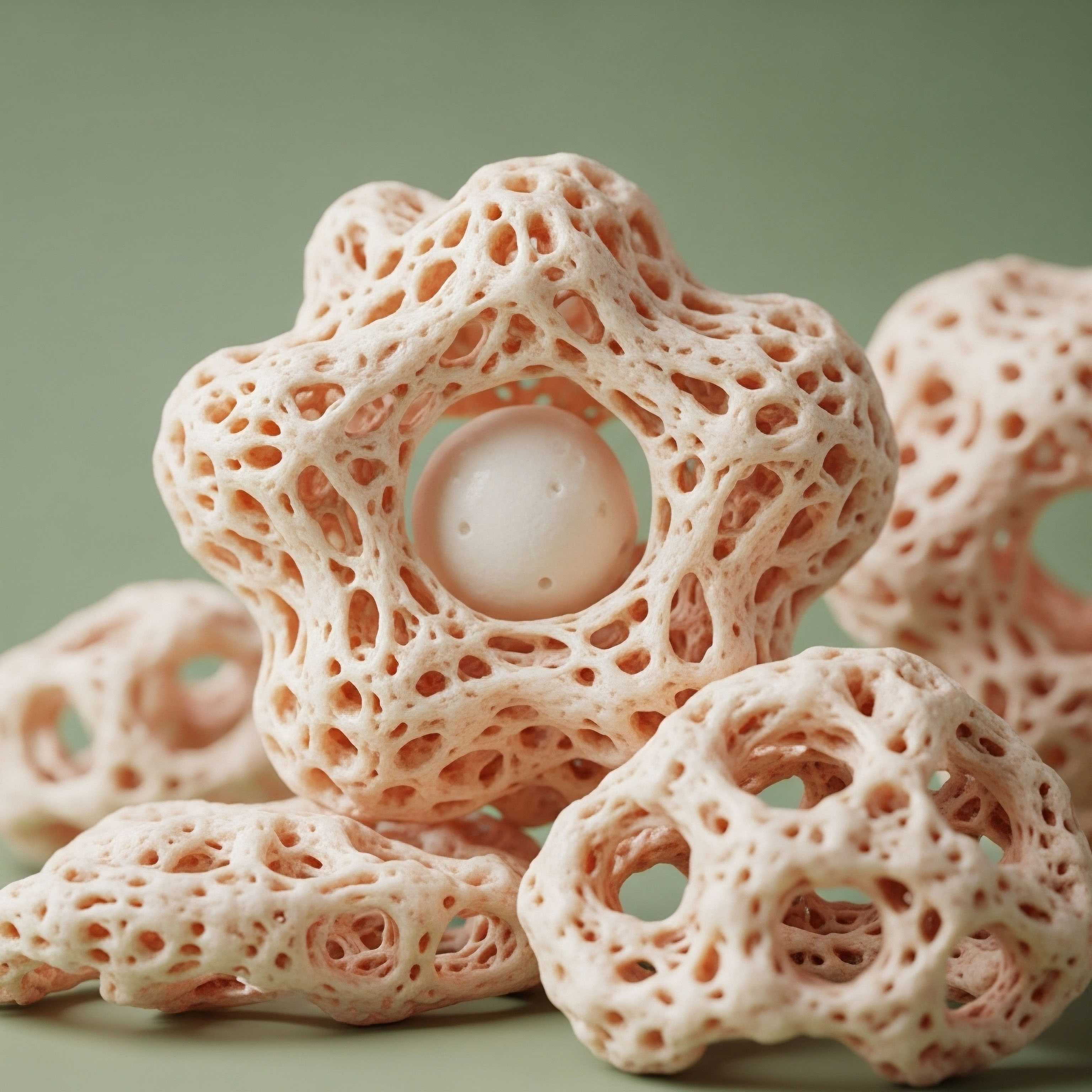

The Cognitive Foundry of Muscle
The pursuit of peak human performance transcends conventional boundaries. We once viewed muscle as a simple engine of movement, a reservoir of raw strength. A deeper understanding reveals its role as a sophisticated endocrine organ, a silent, powerful conductor orchestrating a symphony of biological signals that directly shape our mental landscape. The density of your musculature does far more than dictate physical prowess; it dictates the very clarity, resilience, and processing power of your mind.
Your skeletal muscle tissue actively communicates with your brain, a profound dialogue mediated by specialized signaling molecules known as myokines. These messengers, released during muscular contraction, circulate throughout the body, crossing the blood-brain barrier to initiate a cascade of neurobiological enhancements. This intrinsic connection establishes a direct conduit between physical vitality and neural sharpness, redefining the scope of true human optimization.
Research highlights that muscle-derived BDNF upregulates mitochondrial quality control, enhancing both muscle function and critical neuronal mitochondrial biogenesis.

The Endocrine Amplifier
Muscle mass serves as a dynamic endocrine gland, influencing hormonal balance throughout your system. It modulates insulin sensitivity, a cornerstone of metabolic health that directly impacts brain energy utilization and cognitive function. Robust muscle mitigates systemic inflammation, a chronic aggressor against neural tissue implicated in cognitive decline. Maintaining significant lean mass becomes a proactive defense, preserving the intricate, high-performance machinery of the brain.

Neural Growth Architect
Among the most significant myokines is Brain-Derived Neurotrophic Factor (BDNF). This protein acts as a master key for neurogenesis, the growth of new brain cells, particularly in the hippocampus, the seat of memory and learning. Muscular activity elevates BDNF, literally expanding the brain’s capacity for adaptation and resilience. This internal neural architect facilitates synaptic plasticity, the brain’s ability to strengthen or weaken connections, a mechanism underlying learning and memory formation.
The profound impact of muscle on cognitive architecture extends to mitochondrial health. Muscle-generated BDNF promotes the expression of genes vital for neuronal mitochondrial biogenesis. These cellular powerhouses are essential for sustaining a healthy pool of mitochondria, guarding against oxidative stress and dysfunctional energy metabolism within the brain. The energetic efficiency of your neural networks finds its origin in the metabolic dynamism of your muscle.


Forging Neural Resilience
Cultivating muscle mass requires a deliberate, strategic approach, one that transcends casual exercise. This is a systems-engineering endeavor, where every input is designed to elicit a precise biological output, shaping both your physical form and your cognitive edge. The objective extends beyond aesthetic appeal; it involves building a robust physiological foundation for enduring mental acuity.

Precision Resistance Training
Resistance training stands as the primary catalyst for muscular growth and the subsequent release of neurotrophic myokines. The stimulus must be progressive, challenging the muscle to adapt and grow. Focus on compound movements, engaging multiple muscle groups simultaneously, which maximizes hormonal responses and systemic signaling. Intentional, consistent effort sculpts muscle and, in parallel, fortifies the brain’s capacity for growth and repair.
- Frequency ∞ Train each major muscle group 2-3 times per week.
- Intensity ∞ Lift challenging weights, aiming for 6-12 repetitions per set.
- Volume ∞ Perform 3-5 sets per exercise, ensuring adequate total work.
- Recovery ∞ Prioritize rest and sleep to allow for muscular repair and growth.

Nutritional Blueprints for Biomass
Fueling muscle growth demands a precise nutritional strategy. Protein intake is paramount, providing the amino acid building blocks for muscle repair and synthesis. Aim for a daily intake of 1.6 to 2.2 grams of protein per kilogram of body weight, distributed strategically throughout the day. This protein bolsters the structural integrity of your musculature, directly supporting the myokine production that benefits your brain.
Beyond protein, micronutrient density and healthy fats play a supporting role in optimizing hormonal function and reducing inflammation, further enhancing the muscle-brain axis. The quality of your cellular raw materials directly influences the quality of your physiological output, including cognitive performance.

Hormonal Calibration
Optimal hormonal environments accelerate muscle accretion and amplify its cognitive benefits. Testosterone, growth hormone, and insulin-like growth factor-1 (IGF-1) are central to this process. Maintaining these at their physiological peak supports muscle protein synthesis and also directly influences neurogenesis and synaptic function. Targeted interventions, when clinically indicated, ensure these internal messengers operate at their most effective levels, driving both physical and mental optimization.


A Lifelong Cognitive Dividend
The benefits of building and sustaining muscle mass for mental sharpness are not fleeting; they represent a profound, long-term investment in your cognitive capital. This is a continuous journey of physiological optimization, yielding dividends across every decade of life. The timeline for experiencing these enhancements varies, yet the commitment guarantees a sustained elevation of mental function.

Immediate Neurological Signals
Acute bouts of resistance training initiate immediate shifts in neurochemistry. Post-exercise, there is a measurable increase in circulating myokines, including BDNF, which prime the brain for enhanced learning and memory. This acute response provides a window of heightened cognitive receptivity, a temporary upgrade to your neural processing power. The brain responds to muscular exertion with an almost immediate, profound metabolic and neurochemical rebalancing.

Sustained Cognitive Remodeling
Consistent, long-term engagement with muscle-building protocols leads to structural and functional changes within the brain. Over months, individuals report improved executive function, memory recall, and processing speed. This sustained effort fosters hippocampal neurogenesis, contributing to increased gray matter volume. The brain itself remodels, becoming more resilient and adaptive through its dynamic interplay with muscle.
Aerobic training increased hippocampal volume by 2% in older adults, reversing age-related volume loss by 1-2 years, directly correlating with elevated BDNF levels.

Age-Defying Mental Fortitude
The true power of muscle mass for mental sharpness becomes undeniably clear in the context of longevity. Maintaining significant lean mass counteracts age-related cognitive decline, offering a robust defense against neurodegenerative processes. It preserves the delicate balance of the endocrine system, mitigates chronic inflammation, and sustains the brain’s metabolic efficiency.
This proactive strategy extends your period of peak cognitive performance, allowing you to operate at an elevated level for decades. The muscle you build today safeguards the mind you will inhabit tomorrow, securing a future of unwavering mental acuity.

The Resilient Mind Forged
The journey to a sharper mind leads directly through the disciplined cultivation of muscle. This understanding moves beyond the superficial, revealing muscle as a core determinant of neural health and cognitive longevity. Your commitment to physical strength translates into an unparalleled mental advantage, an enduring clarity that defies the conventional narratives of aging. This is the blueprint for a future where peak physical form and an optimized mind operate in perfect, powerful synchronicity.



